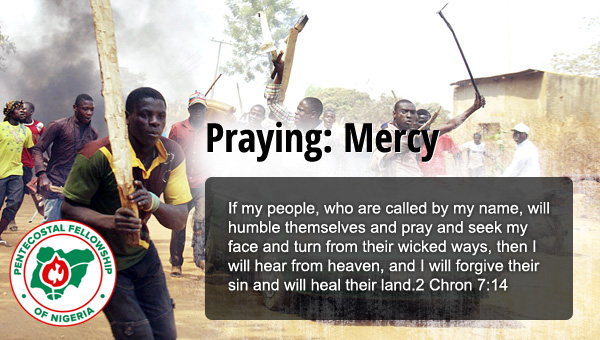Praying for Justice
PRAYING FOR JUSTICE TO REIGN IN THE LAND
An article by Pastor Austen Ukachi
Nigeria would be a better society of our dream if the pursuit of justice is made a cardinal goal in the one year prayer for transformation. All through the Bible, God's desire for justice is conspicuously shown. At times, God was swift to judge injustice like the case between Ahab, Jezebel and Naboth, other times He seemed slow. But, no doubt, God has a strong aversion for injustice (1 Kgs.21; Eccle. 8:11,12).
The Psalmist declares that justice and righteousness are the foundation of God's throne (Psalm 89:14). Several times in the OT, God called on Israel to show justice, mercy and equity in their relationships (Isa.1:17; Micah 6:8). These calls show God's heart for a society where equity, the rule of law and justice reign. The prophet Isaiah, revealed the heart of God for justice more than other prophets. He wrote that the reign of Christ will be characterized by "judgment and justice" (Isaiah 9:7). Several times in the book, the prophet called for justice (Isaiah 1:17; 9:7; 32:1; 56:1; 58:6-10; 59:1-16). In the Bible, the KJV uses the word 'judgment'; while the NKJV and other newer versions use the word 'justice' to mean the same thing. In Isaiah 59, the frequent call for justice is particularly provoking. Six times in the same chapter the prophet referred to the word justice.
In verse 4, he says, "No one calls for justice."
In verse 8, we read, "And there is no justice in their ways."
In verse 9, he declared, "Therefore justice is far from us."
In verse 11, the prophet said, "We look for justice, but there is none."
Once more in verse 14 he wrote, "Justice is turned back."
Then in verse 15, the prophet reveals God’s reaction to all these, "then the LORD saw it, and it displeased Him that there was no justice." These verses clearly show God's concern for justice.
JESUS' TEACHINGS
During His earthly ministry Jesus was not only interested in matters of equity and justice, He condemned covetousness and materialism. Pressed by someone to adjudicate between himself and his brother on matters of inheritance, Jesus had this to say: "Man, who made me a judge or an arbitrator over you?" He then went on to say to the man, "Take heed and beware of covetousness, for one’s life does not consist in the abundance of the things he possesses." (Lk 12:14,15). In Matthew 23:23, He referred to the issues of justice, mercy and faith as "weightier matters" that should have engaged the attention of the Scribes and Pharisees. He rebuked them for ignoring them.
In our society, corruption is one medium through which the miscarriage and perversion of justice is perpetuated. All around us we see the prevalence of injustice in employment, in the offices, in politics, in our legal system, along the street and in our market places. Injustice against the poor, against the rich, against the youth and the less privileged are common. It manifests in the denial of rights, privileges, oppression, false accusation, corruption, false acquisition, perversion of truth, and deliberate cheating.
EXAMPLES
Examples of injustice that are so glaring in our society include:
- The pollution and neglect of the oil producing areas by the multinationals and by successive governments.
- The embezzlement of pension funds by those who are meant to be the custodians of the fund. Many pensioners are left starving, and in some cases, die while waiting for their pension.
- The agreement between the labour unions and the Federal Government which pegged the minimum wage at eighteen thousand naira is another glaring case of the perpetration of injustice. Till now, many of the state governments have not paid the basic minimum wage to workers. It is incredible that a worker earns about $100 per month in a country that is the 7th largest oil and gas producer in the world.
- Our prison cells are filled with many suspects who were arrested for alleged offenses and have stayed many years without being charged to court or tried. The lives of these inmates are wasted due to our callousness and inefficiency. The public jubilated recently when the Lagos State Chief Judged released over 230 prison inmates after several years of incarceration.
- Our domestic debt presently stands at =N= 6 trillion naira. Much of this debt is owed to local contractors who borrowed to execute contracts for the Federal Government, and have waited for years without being paid. These contractors borrowed money at very high interest rates to execute the contracts on the assurance that they will be paid after a short period, but each month their hopes are dashed. Many of them are counting their losses.
- What about the injustice meted out on some citizens in our country who are considered as ‘non indigenes’ in the states where they are domiciled? For several years, many citizens from the south living in the northern states have been persecuted, hounded, killed and their property burnt and looted without any form of protection and defense given to them by the various states or federal government. The blood of many Christians who have been killed while worshipping in their churches must be crying out to God for justice.
COMPLEX
The issues of justice are complex and intractable. After spending 38 years on the Bench, Justice Tabai cautioned that the Judiciary cannot guarantee justice at all times. Recalling a land dispute between two warring communities, Justice Tabai said: “I have seen that there are cases that the judicial process can’t administer justice.” He further went on to say that: "not all cases should go to court, he appealed to the executives to mediate in matters that could threaten peace between communities because judgments sometimes lead to bloodshed."
Sharing his experience on the controversial land dispute, Justice Tabai said the Judgment of the apex court that ceded the land back to the original owners sparked communal clashes, resulting in the death of some residents. Despite the judgment, he said the trespassers are still occupying the land while the winners are in court pursuing enforcement. According to him, “in matters like this, the decision of the court can hardly solve the problem. The executives should provide the answers. Strict enforcement of the court order can’t prevent bloodshed”.
HOW DO WE PRAY?
Against the background of these examples, how then do we pray as intercessors? In Luke 18, in the Parable of the Persistent Widow, the cry of the widow before the judge was, "Get justice for me from my adversary." Her adversary here was just one enemy, but today, we have not just an adversary, but several adversaries. If we must pray for justice then we must pray intelligently, with facts and information. We must avoid demonizing every situation, but learn to discern who the real enemies are, and not wrongly blame other people for our woes. We must distinguish between issues and people. Like the widow in Luke 18, we must be persistent and persevering.
Isaiah seemed to imply that a Holy Spirit outpouring will facilitate the reign of justice in the land. In chapter 32:15-18 we read, "People shall mourn upon their breasts For the pleasant fields, for the fruitful vine. On the land of my people will come up thorns and briers; Yes, on all the happy homes in the joyous city; Because the palaces will be forsaken, The bustling city will be deserted. The forts and towers will become lairs forever, A joy of wild donkeys, a pasture of flocks - Until the Spirit is poured upon us from on high, And the wilderness becomes a fruitful field, And the fruitful field is counted as a forest. Then justice will dwell in the wilderness, And righteousness remain in the fruitful field. The work of righteousness will be peace, And the effect of righteousness, quietness and assurance forever. My people will dwell in a peaceful habitation, In secure dwellings, and in quiet resting places."
For an impactful year of prayer of transformation, the injustices in the land have to be addressed not only through prayer, but also through advocacy and social action. Areas where justice is needed include: in our police stations; in our offices; in the banking halls; the local government offices; in our tax offices; in politics and in all areas of governance.




